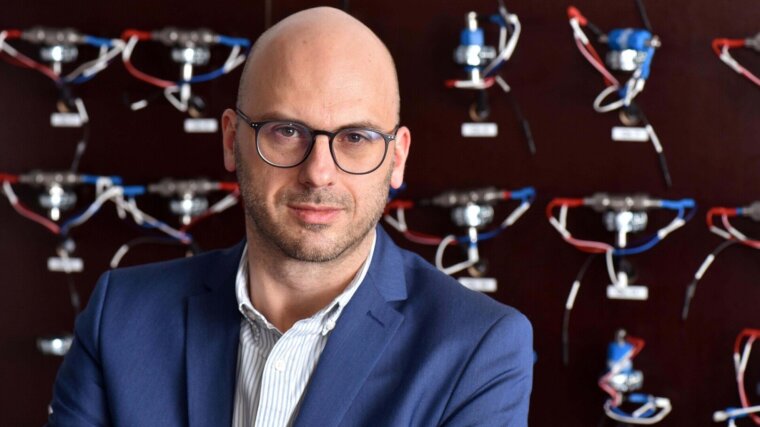
- Research
Published: | By: Ute Schönfelder
The team led by Prof. Andrea Balducci of the University of Jena’s Institute of Technical and Environmental Chemistry is starting two projects this month as part of the EU programme “Novel materials for supercapacitor energy storage” and will receive funding totalling around 950,000 euros. The aim is to develop innovative supercapacitors that are not only more efficient than existing systems, but above all also more sustainable.
The EU wants to be climate neutral by 2050. This ambitious goal can only be achieved if all major sectors – from transport, through industrial production to energy provision – rely exclusively on renewable energy sources instead of fossil fuels. But it is not only energy resources and their extraction that are crucial. “In addition, energy storage systems need to buffer the temporal and spatial energy fluctuations associated with the use of renewable sources in a climate-friendly way,” explains Andrea Balducci.
Lithium-ion batteries can store large amounts of energy and for this reason they are currently used in a wide variety of devices, from smartphones to electric cars. However, their manufacture requires the use of nonabundant metals, such as lithium and cobalt, the extraction of which causes great environmental damage. “Even if lithium-ion batteries are currently indispensable, in the medium and long term we will have to find alternative devices to use together with them,” says Balducci. The professor of Applied Electrochemistry and his team are looking for alternatives in the two new EU projects.
Doing without critical source materials
At the centre of the research efforts are supercapacitors. Compared to batteries, these energy storage devices have the advantage that they can be charged in a matter of seconds and have an almost unlimited lifespan. In the project entitled “Greencap” (Graphene, MXene and ionic liquid-based sustainable supercapacitor), the consortium consisting of teams from seven countries plans to build supercapacitors from 2D materials over the next three years. These should make up for the disadvantage of supercapacitors compared to batteries: the lower energy density. To this end, the researchers are using graphene and MXene, which are currently considered to be two of the most promising materials for energy applications. The Jena chemists are contributing to the project by developing innovative electrolytes based on ionic liquids, as well as mixtures of these and organic solvents.
“Compared to existing electrolytes, these have the advantage that they improve the amount of stored energy and the safety of supercapacitors,” emphasises Prof. Balducci. In addition, ionic liquids are sustainable because they do not require critical raw materials and are easy to recycle.
Another strategy, which is being pursued in the second project, MUSIC (Materials for Sustainable Sodium Ion Capacitors), is to combine the concept of lithium-ion batteries with that of supercapacitors. At the same time, environmentally harmful lithium is to be replaced by more environmentally friendly sodium. Within the framework of the project, which is being funded over four years and involves partners from five European countries, sodium-ion capacitors are to be developed to the point where they are market-ready.
“These combine the advantages of both existing systems,” explains Balducci. “They will have the energy density of batteries and the lifespan and charging times of supercapacitors.” And they will do so while completely avoiding critical source materials. Again, Balducci and his team will focus primarily on developing and characterising electrolyte solutions, which the researchers specialise in. The aim of the project is to create a prototype of a sodium-ion capacitor.